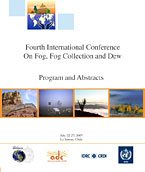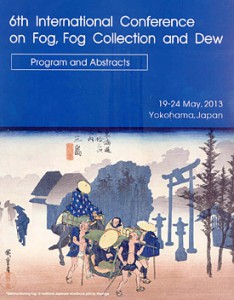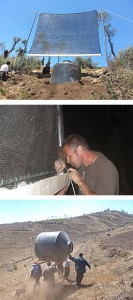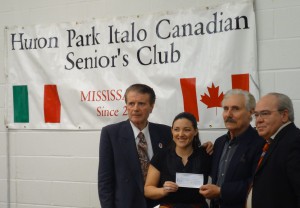We are a small not-for-profit organization operating on an all-volunteer basis. As such, we need to be ever mindful of both the financial and human costs in carrying out our projects. We keep our overhead very low by means such as paying no salaries and paying no rent for office space. In the past we have maintained an office capacity to process VISA, MasterCard and AMEX credit card payments. This has significant costs to both maintain the terminal and to pay a percentage of each transaction to the company providing the service. The demand for such capacity has gone down in recent years now that our website accepts PayPal payments plus credit cards for most items we sell and for some services. We are therefore going to stop our office credit card service shortly unless we hear from our members and visitors that there is a substantive reason to retain it.
January 2014 – Project in Tanzania

The fog collection projects in the central interior of Tanzania are progressing well under the direction of the German NGO ped-world, with whom FogQuest is cooperating. Presently there are fog collectors providing water for secondary and primary schools in Quameyu, Umagi, Endabok, Endoji and Gidng’ata. There are 4 to 6 large fog collectors (LFCs) in each location. FogQuest has just sent 10 rolls of the mesh we use in fog collectors, from Chile to Tanzania. This is enough for up to 50 LFCs. It is expected that 10 new LFCs will be built in 2014. The four photos here are courtesy of ped-world and show some of the collectors and water tanks at the schools.
Latest News – September 2013
September 2013 – New Project in Chiquisis, Guatemala
In March of this year FogQuest began the evaluation stage of a new fog collection project in Guatemala in cooperation with our local partner Vivamos Mejor (VM), a Guatemalan NGO whose executive director is Eduardo Secaira Juarez. Two volunteers went from Canada, Dr. Richard Taylor and Craig van Lankveld (see photo). They worked with staff of VM, and people in the village, to set up three Standard Fog Collectors (SFCs) and one Medium Fog Collector (MFC) (see photo).
The principal goals for the trip were to do an initial village needs assessment and to put the infrastructure in place to enable the fog collection rates to be determined. The village of Chiquisis has a population of approximately 750 people, living in 140 houses. The location chosen to erect the fog collectors is a 20 minute walk east of the village. From here, fog water could be taken by pipe into the village and should the evaluation show there is sufficient water production, the next stage would be to plan a major water supply using Large Fog Collectors (LFCs).
At present, there is one large tank (see photo) beside the MFC. The villagers only local source of water is an inconsistent spring accessed by earth trenches about a 30 minute walk uphill from the homes. The village needs assessment prepared by Craig and notes on the materials and their costs prepared by Rick are very helpful documents. The reports by VM show the measurements are now going well. Because we are in the rainy season at present, very large amounts of water are being produced by the SFCs and the MFC on days with rain, or rain and fog, and lesser amounts on days with only fog. This is as expected and so far the results for the site are positive.
We will have to continue the evaluation into the next dry season to better understand the seasonality of the water production. We will also have to spend more time with the villagers to see how they envisage a new water supply helping their community.
Your support through donations to FogQuest will help us to carry out this work.
September 2013 – FogQuest Makes Conference Proceedings Available
 For a number of years it has not been possible to purchase copies of the proceedings from the earlier conferences on fog and fog collection.
For a number of years it has not been possible to purchase copies of the proceedings from the earlier conferences on fog and fog collection.
In response to requests from libraries, scientists and others interested in the field, we have now scanned the proceedings from the 1998 Conference in Vancouver, Canada, the 2001 Conference in St. John’s, Canada, the 2004 Conference in Cape Town, South Africa, and the 2007 Conference in La Serena, Chile.
This makes a total of over 400 excellent short papers available for easy download. Please visit our Conference page or the FogQuest Store on this website if you would like to acquire a copy of one or more of the proceedings volumes.
August 2013 – FogQuest projects featured at UNESCO Conference
 FogQuest´s unique integrative project approach that addresses the physical and social considerations needed for successful projects has been recognized internationally. In May 2012, FogQuest´s Fernanda Rojas presented a paper on two of our initiatives at the UNESCO Conference on Technologies for Sustainable Development held at the Swiss Federal Institute of Technology in Lausanne.
FogQuest´s unique integrative project approach that addresses the physical and social considerations needed for successful projects has been recognized internationally. In May 2012, FogQuest´s Fernanda Rojas presented a paper on two of our initiatives at the UNESCO Conference on Technologies for Sustainable Development held at the Swiss Federal Institute of Technology in Lausanne.
Co-written with Virginia Carter and Melissa Rosato, Fog Collection Technology Transfer and Co-Creation Projects in Falda Verde, Chile and Tojquia, Guatemala (http://link.springer.com/chapter/10.1007/978-3-319-00639-0_23) was chosen out of 82 submissions for inclusion as a chapter in the book: “Technologies for Sustainable Development: A Way To Reduce Poverty?” published by Springer in August 2013.
The themes of empowerment and knowledge sharing discussed in the chapter are critical for methodologies that value capacity building and sustainability. It is our hope to continue sharing our lessons learned with the wider development community in order to increase the potential for successful fog collection projects.
August 2013 – New pilot project in Nepal
 Building on the success of a two panel project at the Prathivara temple in the Ilam district, a new pilot project with a new SFC data recording system and some different structural materials will be established this October in the Tapeljung district of eastern Nepal. This project involves three partner agencies; FOST (Foundation for Sustainable Technologies) in Kathmandu will assist in the construction, Toronto based NCDF ( Nepal Community Development Foundation) is financing and developing the collector, and NCDC ( Namsaling Community Development Centre) will maintain the system and monitor the collection data.
Building on the success of a two panel project at the Prathivara temple in the Ilam district, a new pilot project with a new SFC data recording system and some different structural materials will be established this October in the Tapeljung district of eastern Nepal. This project involves three partner agencies; FOST (Foundation for Sustainable Technologies) in Kathmandu will assist in the construction, Toronto based NCDF ( Nepal Community Development Foundation) is financing and developing the collector, and NCDC ( Namsaling Community Development Centre) will maintain the system and monitor the collection data.
FogQuest continues its participation in the fog collection projects in Nepal through the involvement of one of our directors, Tony Makepeace, and guidance on construction, materials and sites.
This project will feature a new and experimental method of recording the collection data. NCDF director Byron Bignell has been developing an automated data-logging system to record the volume of water collected by an SFC. The system is solar powered and uses a combination of hardware and software to record data from a tipping rain guage. The information is stored on a memory card internally for later retrieval.
The image shown on the left is an earlier SFC that was installed in 2008 in the evaluation stage for the larger system that is currently in place and operational in eastern Nepal. We hope to build on this success and add more systems as demand and awareness increases.
May 2013 – Successful Conference in Yokohama, Japan
 The conference in Yokohama was a great opportunity to renew old friendships and to discuss the latest research and news concerning fog, fog collection and dew. It was one of the smaller conferences in terms of numbers, about 120 participants from about 25 countries, but one of the most pleasant due to the constant attention received from our hosts and their volunteer staff.
The conference in Yokohama was a great opportunity to renew old friendships and to discuss the latest research and news concerning fog, fog collection and dew. It was one of the smaller conferences in terms of numbers, about 120 participants from about 25 countries, but one of the most pleasant due to the constant attention received from our hosts and their volunteer staff.
Professor Manabu Igawa and his superb organizing committee did a wonderful job of seeing that we spent long hours in conference sessions while still finding time for a tour of the Japanese countryside and a relaxing banquet cruise in the Yokohama harbour. For those of you who have not experienced the strong bonds that have developed amongst those working in this specialized community, you are invited to join us at the 7th International Conference on Fog, Fog Collection and Dew in Wroclaw, Poland in 2016.
There is more information on the FogQuest Conference page.
December 2012 – Thanks for your support!
During this season of giving, FogQuest is very appreciative of donations we receive to help with our water projects. Our sincere thanks to all the individuals involved. We would like to especially acknowledge the following groups who have donated recently:
- Rotary Club of Kamloops Aurora Centennial,
Kamloops, British Columbia, Canada $5000
- St. Francis Catholic High School students,
St. Catharines, Ontario, Canada $5000
- Barriere Secondary School students,
Barriere, British Columbia, Canada $550
- Huron Park Italo Canadian Seniors Club
Mississauga, Ontario, Canada $1000
- Rotary Club of Kamloops Hybrid Interact,
Kamloops, British Columbia, Canada $1000
Each and every donation helps provide clean water to those in need. No donation is too small. Get your company, service club, family and friends on board and be a part of FogQuest’s work today.
Become a FogQuest member for 2013 or make a donation today and help us change the world.
Colombia – October 2012
Evaluation Project Update
Together with our NGO partner in Colombia, Fundación Occidente Colombiano (FUNCO), FogQuest continues to develop an operational project at site KM 18.
Positive water collection rates from non-standard SFCs are coupled with much enthusiasm. The students at the local school Francisco Jose Lloreda Mera (Francisco Miranda campus) focused on their experiences with fog collection as their final term projects. These student presentations have served to heighten local and regional knowledge about fog collection technology. Local NGOs, university and government stakeholders are hearing from the youth all about the untapped possibilities in their backyards. Catch a glimpse of this emerging project through the short video produced by FUNCO. ¡Disfrútalo! Enjoy!
Evaluation Project Update – Mount Kilimanjaro – October 2012
As reported in August 2011, there are now Standard Fog Collectors (SFCs) installed on Mount Kilimanjaro in Tanzania. This was a joint effort led by our partner ped-world in Germany. FogQuest staff have not been to the field location. There is a tremendous need for fresh water for guides, rescue personnel and visitors on the upper part of the mountain. Up to now the water has to be carried 8 km to these high elevation huts. FogQuest is helping to determine whether the frequent fog found there can be a viable source of fresh water.

The altitude at Barafu is 4600 m and at Kibo-Hut 4750 m. Both are on Kibo-Saddle, the last camp before you reach the peak (5895m). Some data were collected after the initial installation to show that the SFC at Barafu was not properly located. The SFC at Kibo was reported by Bernhard Kueppers of ped-world to have produced large amounts of water for several months but there were problems with how the mesh was installed. The ped-world staff can only reach the sites perhaps once a year and are re-establishing the sites with plans to obtain better data sets.
New Project – Tanzania – Fall 2012
Over the last year construction of Large Fog Collectors has proceeded in central Tanzania near Mbulu. The FogQuest fog collection technology is being used by a German NGO, ped-world, to assist villages and schools with water supplies. To date eight large fog collectors (LFCs) have been built at three sites.

We don’t have specific water production figures but the results are encouraging and both the number of LFCs and the number of sites will be increased with time. This is an example of the expanding application of our technology. Staff of ped-world spent time at the field site in Morocco learning FogQuest construction techniques, gaining access to the FogQuest manual and other documents, and were sent mesh to use in the LFCs. In addition we have had numerous discussions regarding the construction of fog collectors and operation of field projects; however, the actual field work in Tanzania is funded by ped-world as part of their wider efforts in the country and is under the direction of ped-world.
Latest News – October 2012
New Evaluation Project in Peru
Professor Ben Spencer from the University of Washington (Architecture/Landscape Architecture) and Professor Susan Bolton (Environmental and Forest Sciences) have been working in the community of Lomas de Zapallal, Lima, Peru for the past few years. As part of the US EPA’s People Planet and Prosperity (P3) student competition they have now, with the assistance of FogQuest, started a fog collection evaluation project at Lomas de Zapallal. Five modified Standard Fog Collectors were installed in September 2012.

This location is quite close to the Cerro Orara project site where Robert Schemenauer, Pilar Cereceda and Marcella Suit worked in the 1990s. The project is a learning experience for students from the University of Washington and potentially a new water source for the community in Peru.
FogQuest part of Eco Future Exhibit
Museum exhibit will run until Sept. 2013
Aimed at families, Eco Future is a new museum exhibit that opened at the end of September 2012 in Abu Dhabi at Manarat Al Saadiyat (a major cultural venue in Abu Dhabi). Visitors will move through different zones based around lifestyle elements (Eating, Drinking, Enjoying, Moving) where they can, through playing games and interactive tools, design their city of the future. Each zone will also display innovative new products and technologies that can help us live more sustainably.
FogQuest has provided mesh for the construction and display of two small Standard Fog Collectors, as well as a photo of fog collectors in Nepal, for the Drinking Zone of the exhibit. We at FogQuest work to promote fog collection as an important and sustainable water production technology integral to a greener future, especially in arid regions such as the Middle East.
New project – Colombia
New Project – Colombia – March 2012

Work, led by FogQuest volunteer Jose Manuel Molina, is progressing on a new operational project in Colombia. Jose Manuel and his colleagues have previously completed some initial evaluation studies. Jose’s colleagues Andres and Conchita have installed some new Standard Fog Collectors (SFCs) this month and report very good fog collection rates. Work is at and near the KM-18 site in the Valle del Cauca near Cali. The goal is to provide water for the village at KM-18 and measurements are being done by the students at the school there. FogQuest has provided mesh for the SFCs and also funds to purchase raingauges to monitor rainfall at the sites. We also provide advice and guidance through Jose to the group in Colombia and will be involved in the operational project when funding is obtained. Your donations to assist with this project would be very helpful





